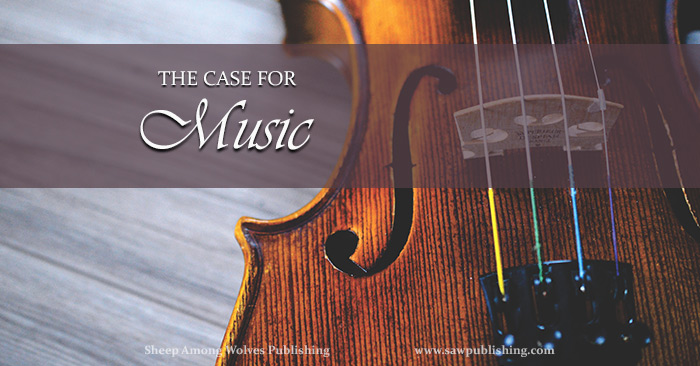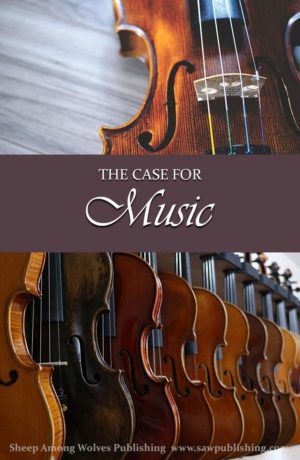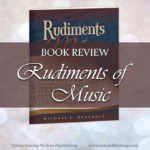The Case for Music
 Yes, it’s that time of year again! You’ve got your core subjects all lined up. You’ve got a (semi) workable draft of your schedule finalized. You’ve yielded to the impulse buy, and grabbed an extra set of pencil-box-and-three-ring-binder-supplies at the back-to-school sale.
Yes, it’s that time of year again! You’ve got your core subjects all lined up. You’ve got a (semi) workable draft of your schedule finalized. You’ve yielded to the impulse buy, and grabbed an extra set of pencil-box-and-three-ring-binder-supplies at the back-to-school sale.
You sat up to midnight last night, running the unit studies through the printer. Now you just have to make your final elective cuts.
Is music going to be one of them?
In an educational setting where every second counts, can you actually justify spending time on something as non-essential as piano lessons—or choir practice—or opening up the hymnal and letting the kids pick a song?
At the end of the day, just how compelling is the case for music?
If you like reading posts that surprised the author, then this one is for you! Because even though I deeply value music, I was amazed at just how strong the case actually is!
1) Music is An Integral Part of the Christian Life
 Really? When I first typed that heading, I had “Music Contributes to Worship.” That felt like an understatement. But something inside me sort of cringed typing the new one. I mean, after all—isn’t it a bit of an overstatement?
Really? When I first typed that heading, I had “Music Contributes to Worship.” That felt like an understatement. But something inside me sort of cringed typing the new one. I mean, after all—isn’t it a bit of an overstatement?
On sober consideration, I don’t believe it is. Music is more than an elective in the Christian life! It’s a command. And it’s a command that’s there for a vital purpose!
The best article I ever read on this topic is Shenandoah Christian Music Camp’s Why Does the Church Sing? If you haven’t read it before—hop over and read it now! Wendell Nisly insightfully explores the reasons for music in the believer’s life from several unique angles.
2) Music Develops the Brain
According to a recent study by the University of Southern California, the benefits of music education include improved sound processing, language development, speech perception, and reading skills.
Assal Habibi, lead author of the study, says results “reflect that children with music training . . . were more accurate in processing sound.”
This is more than a “skills acquired by practice” type of phenomenon. The research indicates that the actual auditory system, including brain pathways, develops at a measurably accelerated rate when students are exposed to music education.
3) Music Builds Community
I totally owe this point to a guest speaker who did a series at our church a couple of years ago. He was speaking in context of congregational singing—particularly acapella singing—but I think it’s a phenomenon that extends in varying degrees to every form of music which includes two or more musicians.
Multi-part music is something you can’t play by yourself. (Multi-track recordings aside, of course!) Music as a school subject draws students together, because it places them in a position where they depend on one another—a position where they can work together—and a position where they can see prompt and rewarding results of their dependence and teamwork.
Music is a valuable school subject because it builds community, above and beyond the benefits of the actual music itself.
Runner Up Argument: Music Reduces Stress
We are all familiar with this concept on a certain level, and yet most of us are still surprised to discover just how huge a role music really can play in helping our minds to function in a healthy way.
Studies not only suggest that relaxing music produces a measurable decrease in stress levels, according to research from Stanford University, “Listening to music seems to be able to change brain functioning to the same extent as medication, in many circumstances.”
My Verdict on the Case for Music
It’s no coincidence that music in one form or another plays a vital role in virtually every country and culture around the world. Music is good for us! It’s good for us from a spiritual perspective. It’s good for us from a physical perspective. It benefits students while they’re in school, and it gives them a skill they will use throughout life.
Music is much more than an optional add-on to your child’s school years. Whether it means formal tuition, home-based lessons, or just singing around the breakfast table, music is a vital part of every education.
Looking for some new, solidly-written music to get you started? See our previous post:

Looking for a book that will teach you the rudiments of music with a view to acapella singing? With frequent examples from well-known hymns, and a clear focus on training singers for the glory of God, Rudiments of Music by Michael L. Overholt is a distinctly Christ-centred approach to musical education.

How important is Christian poetry for high school? In many ways, a student’s high school years will be some of the most formative of their entire life. Christian poetry has the potential for an eternal impact.

“It’s Christmas,” Mia told herself for the fiftieth time. “Christmas.” From the outside, the snow-globe world is a picture postcard of Christmas joy and peace. But are there aching hearts concealed beneath the dancing snowflakes or drowned by the chiming bells?

